Women’s Democracy Network
OUR STORY | Where it all Began: In March 2006, the Women’s Democracy Network (WDN) was established by Judy Van Rest to prepare women for greater participation in public life. Since then, WDN has built a platform to connect aspiring and experienced women leaders.
WDN: Where it All Began
April 2006
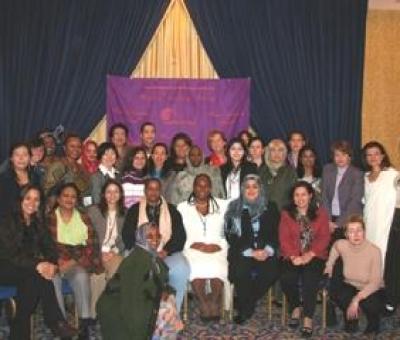
LAUNCH OF WOMEN’S DEMOCRACY NETWORK
u003cpu003eAt a global conference bringing together women from around the world, the International Republican Institute announced the creation of the Women’s Democracy Network, a network for women designed to increase political and civic leadership. u003c/pu003eu003cpu003eu003c/pu003e
August 2006
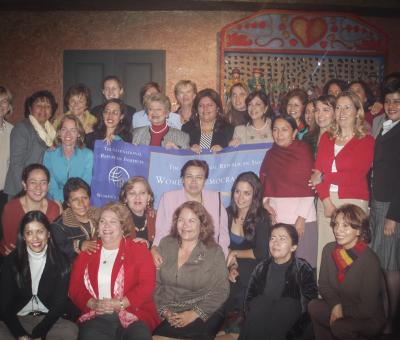
FIRST REGIONAL CONFERENCE— LATIN AMERICA AND THE CARIBBEAN
u003cpu003eu003cstrongu003eThirty-two women leaders from 15 Latin American and Caribbean countriesu003c/strongu003e participated in the first WDN regional conference in Latin America. Participants identified the challenges and opportunities for women’s leadership.u003c/pu003eu003cpu003eu003c/pu003e
August 2006
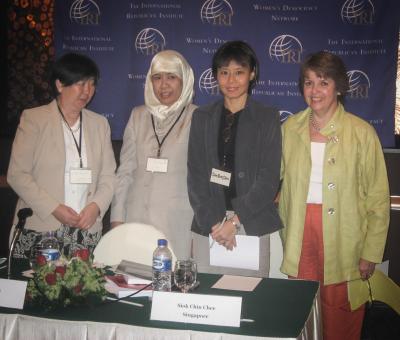
SECOND REGIONAL CONFERENCE—ASIA
u003cpu003eu003cstrongu003eTwenty-six Asian women leaders representing 11 countriesu003c/strongu003e came together in Jakarta, Indonesia to discuss the challenges and opportunities for women in governance and politics in Asia.u003c/pu003e
October 2006
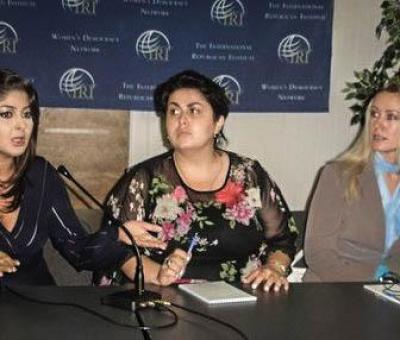
THIRD REGIONAL CONFERENCE—EURASIA
u003cpu003eThe Women’s Democracy Network’s third regional conference was hosted in Kiev, Ukraine. u003cstrongu003eThirty women leaders from 10 countries u003c/strongu003ein Eurasia came together for a two-day conference to address the challenges and opportunities for women’s participation in the region. u003c/pu003eu003cpu003eLiubov Maiboroda, Deputy of the Cherasky Oblast in Ukraine, provided a special training on women’s fundraising issues. u003c/pu003e
October 2006
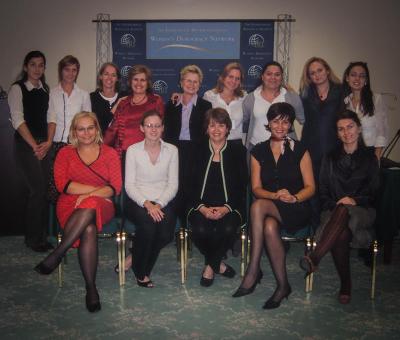
FOURTH REGIONAL CONFERENCE— EUROPE
u003cpu003eu003cstrongu003eEleven women leaders representing Albania, Bosnia u0026amp; Herzegovina, Macedonia, and Turkey, came together for a two-day regional conferenceu003c/strongu003e in, Skopje, Macedonia. The conference included opening remarks by U.S. Ambassador Gillian A. Milovanovic. u003c/pu003eu003cpu003eParticipants focused on regional challenges and opportunities and how to recruit women for political leadership roles. u003c/pu003e
December 2006
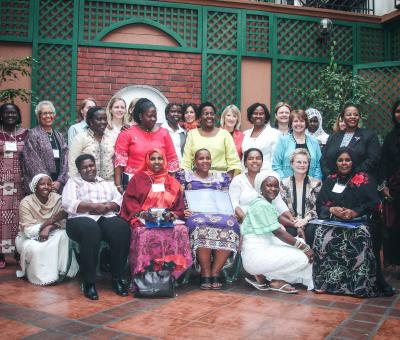
FIFTH REGIONAL CONFERENCE—AFRICA
u003cpu003eu003cstrongu003eThirty-three women participants representing 12 countries in Africau003c/strongu003e took part in a two-day conference in Nairobi, Kenya. Panels included a discussion on challenges and opportunities for womenu003cstrongu003e u003c/strongu003ein Africa, led by two participants who attended the inaugural conference in Washington, DC.u003c/pu003eu003cpu003eu003c/pu003e
December 2006
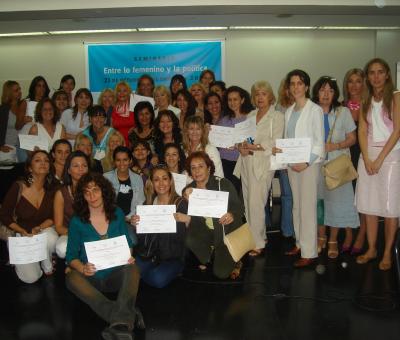
TRAILBLAZERS: RAQUEL MUNT AND GLADYS GONZALEZ FROM ARGENTINA
u003cpu003eIn 2006, WDN members Raquel Munt and Gladys Gonzalezset a powerful example for Argentinian women as members of Compromiso para el Cambio, a center-right political party. In the process, u003cstrongu003ethey discovered a true talent to encourage women to participate in public lifeu003c/strongu003e. With the help of WDN and the u003cemu003eFundación Creer y Creceru003c/emu003e, Gonzalez and Munt developed a political leadership training school in Argentina which prepared women for political leadership through an eight-part seminar, despite a history of dictatorship and a culture with traditional views on gender roles, attracting hundreds of participants in the first series.u003c/pu003eu003cpu003e2007u003c/pu003eu003cpu003eu003c/pu003e
February
2007
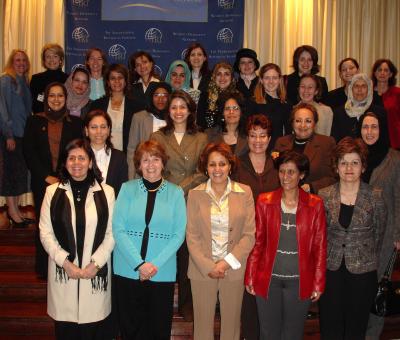
REGIONAL CONFERENCE—MIDDLE EAST AND NORTH AFRICA
u003cpu003eTwenty-nine women representing nine countries from the Middle East and North Africa came together for a regional conference in Amman, Jordan. Participants focused on opportunities for Jordanian women to participate in political and civil life. u003c/pu003eu003cpu003eRana Al-Hajaia, former mayor of the Al-Hassa Municipality in Jordan, shared experience using u003cstrongu003eher position to encourage other Jordanian women to become more politically active and to consider running for public officeu003c/strongu003e. She reinforced the importance of learning from role models, a key goal of WDN.u003c/pu003e
March
2007
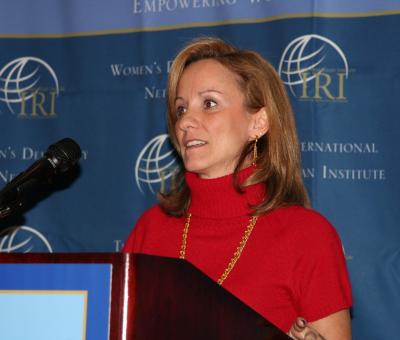
FIRST ANNUAL INTERNATIONAL WOMEN’S DAY CONFERENCE
u003cpu003eIn honor of International Women’s Day (IWD), WDN hosted u003cstrongu003e21 women from 19 different countriesu003c/strongu003e. Participants included women from WDN’s past regional conferences who had demonstrated a proven interest in continuing WDN’s work and who committed to leading a “working group” in their country for one year. u003c/pu003eu003cpu003eIn their action plans, u003cstrongu003eparticipants first introduced the idea of Country Chapters as a way to promote WDN in their countriesu003c/strongu003e. u003c/pu003e
May
2007
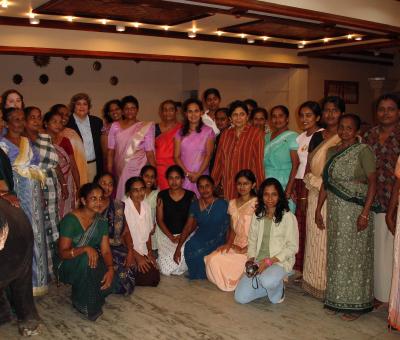
WOMEN DEFINING POLITICS CONFERENCE IN SRI LANKA
u003cpu003ePolitical figures in Sri Lanka gathered to discuss how to increase women’s participation in Sri Lankan politics at a conference hosted by IRI-Sri Lanka, WDN and the Association of War Affected Women. The conference u003cstrongu003econnected more than 70 women representing all levels of political involvement in Sri Lankau003c/strongu003e, and brought together prominent women leaders from throughout Asia to identify ways to increase women’s political participation.u003c/pu003eu003cpu003eu003c/pu003e
May
2007
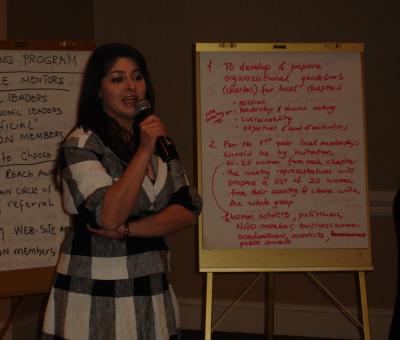
LAUNCH OF WDN’S MENTORSHIP PROGRAM
u003cpu003eIn the spring of 2007, WDN launched a u003cstrongu003ementorship programu003c/strongu003e enabling women to share their professional experiences with each other through email, the WDN website, phone or in person.u003c/pu003eu003cpu003eu003c/pu003e
August
2007

BI-REGIONAL ADVOCACY TRAINING FOR WOMEN LEADERS IN EURASIA AND ASIA
u003cpu003eWDN conducted an interactive advocacy workshop in Jakarta, Indonesia, for women civil society leaders from Bangladesh, Cambodia, East Timor, Indonesia, Kyrgyz Republic, Malaysia, Moldova, and Ukraine. u003cstrongu003eFor many participants, this was the first opportunity to engage with women from other countriesu003c/strongu003e and discuss issues that transcended regional boundaries. Dr. Siti Musdah Mulia, recipient of the U. S. State Department’s 2007 Woman of Courage award, spoke to participants about her efforts to u003cstrongu003epromote, defend and restore women’s rights in Indonesia.u003c/strongu003eu003c/pu003eu003cpu003eu003c/pu003e
December
2007
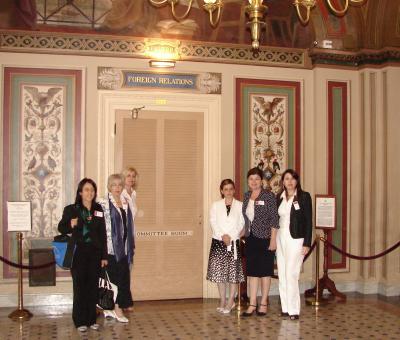
U.S. STUDY TOUR FOR FEMALE MEMBERS OF THE MACEDONIAN PARLIAMENT
u003cpu003eIRI hosted a U.S. study and networking visit for u003cstrongu003esix prominent female members of the Macedonian Parliamentu003c/strongu003e. The delegation u003cstrongu003emet with seven members of Congressu003c/strongu003e and their counterparts on Capitol Hill.u003c/pu003eu003cpu003e2008u003c/pu003eu003cpu003eu003c/pu003e
February
2008
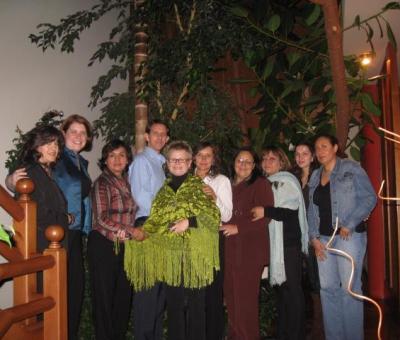
LAUNCH OF COUNTRY CAPTAINS
u003cpu003eThe creation of WDN’s u0022Country Captainsu0022 emphasized u003cstrongu003ea member-driven and local-ownership approach to WDN’s worku003c/strongu003e. Women from Albania, Macedonia, Romania, Slovakia, Bulgaria, Georgia, Sri Lanka and Brazil were selected to serve as a point of contact between the WDN headquarters in Washington, DC and other WDN members in their country and region. Through grassroots initiatives such as working groups for women activists and advocacy campaigns, u003cstrongu003eCountry Captains were able to build community and country-level networksu003c/strongu003e.u003c/pu003eu003cpu003eu003c/pu003e
March
2008
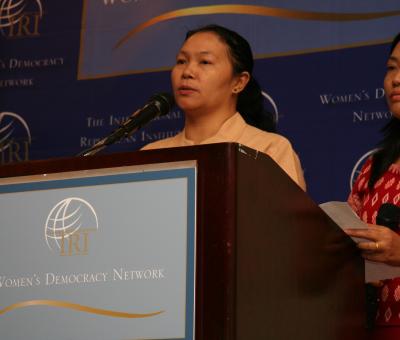
INTERNATIONAL WOMEN’S DAY CONFERENCE
u003cpu003eMembers from Azerbaijan, Belarus, Brazil, Burma, China, Egypt, Georgia, Indonesia, Kenya, Lebanon, Macedonia, Moldova, Morocco, Peru, Romania, and Sri Lanka gathered in Washington DC to participate in the annual International Women’s Day Conference. u003c/pu003eu003cpu003eThe conference focused on u003cstrongu003ementorship, leadership, global awareness and developing strategies to affect change in their countriesu003c/strongu003e. Congresswoman Kay Granger (R-TX) opened the conference by sharing her personal story as a mother, local city council member and current member the United States House of Representatives. Representative Granger challenged the participants to reach out to women from their communities and encouraged them to join organizations, serve on council boards and run for office. u003cstrongu003e“I am where I am today, serving in Congress, simply because a friend called me and made the simple suggestion that I try.”u003c/strongu003e u003c/pu003eu003cpu003eDuring the conference, IRI inaugurated the u003cstrongu003eJeane J. Kirkpatrick Awardu003c/strongu003e, named in memory of Dr. Kirkpatrick, a long-time IRI board member and a strong advocate for IRI’s women’s programming and the establishment of WDN. u003c/pu003e
March
2008
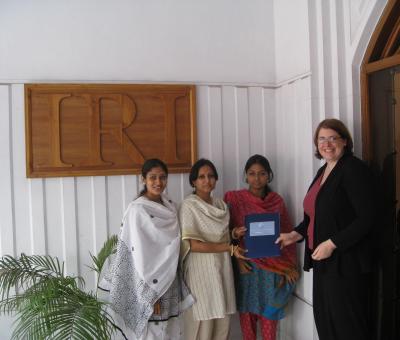
CREATING LOCAL OWNERSHIP: SUBGRANT PROGRAM LAUNCH
u003cpu003eWDN launched a subgrant program to fund member-led projects in their home countries. u003c/pu003eu003cpu003eAs a starting point, a committee of five experts selected four women-led organizations from Bangladesh, Mali, Colombia, and Macedonia to receive grants and partner with WDN. For example, WDN supported a project in Mali that u003cstrongu003eprovided women with the skills to participate and be elected to political positions in local government and the national legislatureu003c/strongu003e. u003c/pu003e
July
2008
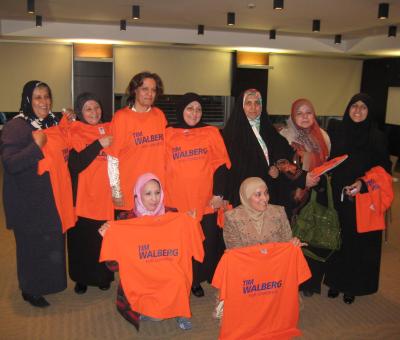
MIDDLE EAST NORTH AFRICA AND EUROPE BI-REGIONAL CONFERENCE
u003cpu003eWDN assembled twelve women political and civic leaders from u003cstrongu003eIraq, Bahrain, and Lebanon u003c/strongu003eto u003cstrongu003ecreate grassroots campaign strategiesu003c/strongu003e. u003c/pu003eu003cpu003eu003c/pu003e
August
2008
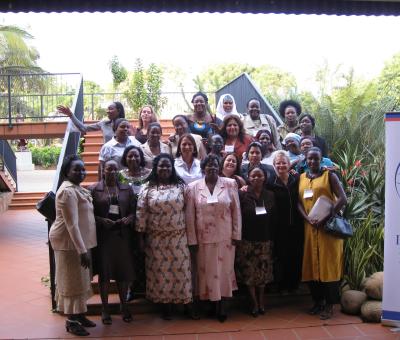
AFRICA, LATIN AMERICA AND THE CARIBBEAN BI-REGIONAL CONFERENCE
u003cpu003eMore than 25 female political party activists and legislators from u003cstrongu003eAngola, Somaliland, Sudan, Nigeria, Malawi, Kenya, and Uganda u003c/strongu003ehad the opportunity to meet with their counterparts from u003cstrongu003eVenezuela, Peru, and Nicaraguau003c/strongu003e. During their time together, they participated in a leadership and campaign management training where they shared best practices and discussed u003cstrongu003echallenges and solutions to the political gender gapu003c/strongu003e.u003c/pu003eu003cpu003e2009u003c/pu003eu003cpu003eu003c/pu003e
April
2009
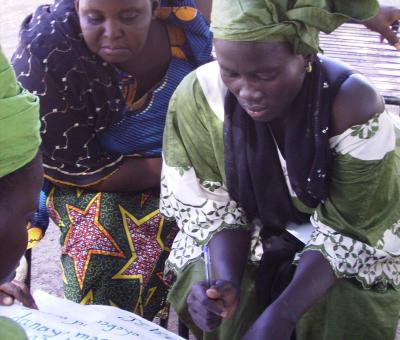
MALI ELECTION: SUBGRANTEE SUCCESS
u003cpu003eFemmes et Droits Humains (Fu0026amp;DH), a WDN subgrantee in Mali, supported the women candidates in the April 2009 municipal elections in Kati. Fu0026amp;DH conducted synchronized radio panels on the two main local radio stations of the commune for women candidates to discuss their political messages. u003c/pu003eu003cpu003eOn Election Day, u003cstrongu003efour women were elected, all of whom were WDN subgrant program participantsu003c/strongu003e.u003c/pu003e
April
2009
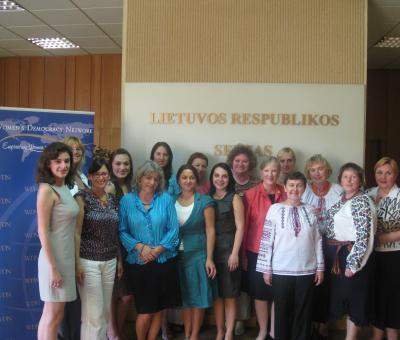
MEMBER SUCCESS STORY: CORINA FROM MOLDOVA
u003cpu003eWDN member Corina Fusu participated in the 2008 WDN Eurasia regional conference in Vilnius, Lithuania. Following the conference, Corina was selected for the candidate list for the April 2009 Moldovan parliamentary elections. In July, u003cstrongu003eCorina was successfully elected for the first time as a member of parliamentu003c/strongu003e representing the Liberal Party. After her election, Cornia went on to head the parliamentary commission for education, culture, media, youth and sports and became deputy president in her political party.u003c/pu003eu003cpu003eu003c/pu003e
April
2009
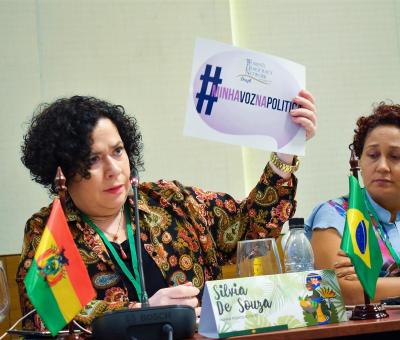
MEMBER SUCCESS STORY: SILVIA FROM BRAZIL
u003cpu003eWDN advisory council member and country captain, Silvia de Souza, u003cstrongu003eworked for several years drafting gender equality quota lawsu003c/strongu003e. In April 2009, two of the laws were presented to the Brazilian National Congress. u003cstrongu003eThe quota legislation passed in 2009 and was first applied in 2012 municipal elections.u003c/strongu003eu003c/pu003eu003cpu003eu003c/pu003e
May
2009
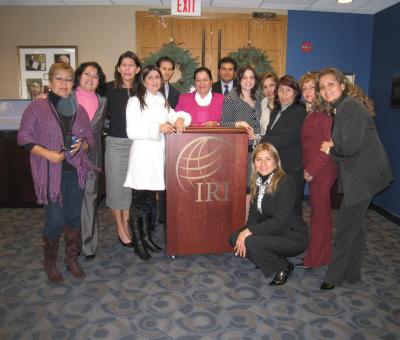
BOLIVIA, JORDAN AND GUATEMALA: THE BIRTH OF COUNTRY CHAPTER PROGRAMMING
u003cpu003eWDN started country chapters to connect aspiring and accomplished women leaders across the globe, creating forums for sharing ideas and experiences, providing technical training and resource materials. The Bolivia Chapter piloted the Country Chapter program. u003c/pu003eu003cpu003eWDN staff worked with members on a u003cstrongu003efundraising plan to generate local resources u003c/strongu003efor the Chapter’s country-level activities and conduct a training for current local elected officials on fundraising for their re-election campaigns. u003cstrongu003eSixty-five women elected officials u003c/strongu003efrom the La Paz administrative district participated in the training. u003cstrongu003eSoon after, the Jordan and Guatemala chapters were established.u003c/strongu003eu003c/pu003e
May
2010
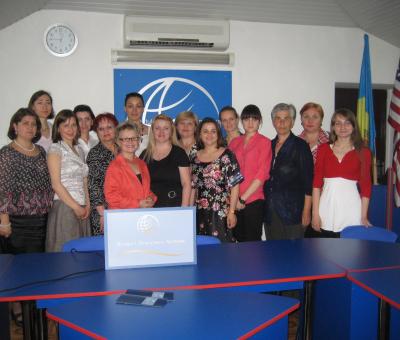
LAUNCH OF THE MOLDOVA COUNTRY CHAPTER
u003cpu003eThe Moldova Chapter’s membership includes u003cstrongu003elocal councilors, members of parliament, civil society representatives, business leaders, media representatives, academics and university studentsu003c/strongu003e. Since its founding, the Chapter has conducted Women’s Leadership Schools, Women’s Political Leadership Academies and more than 25 round tables.u003c/pu003eu003cpu003eu003c/pu003e
November
2010
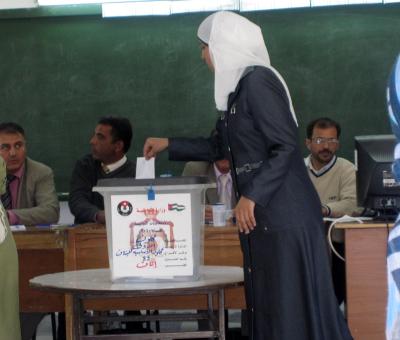
ELECTION OBSERVATION IN JORDAN
u003cpu003eWDN was invited to participate in IRI’s election monitoring of Jordan’s November 10, 2010, parliamentary elections – gainingu003cstrongu003e insight into women’s participation in politics in Jordan. u003c/strongu003eu003c/pu003eu003cpu003eIn the lead up to the parliamentary elections, the WDN Jordan Country Chapter expanded its network by conducting several political consultations and strategy sessions, and u003cstrongu003ehosted a roundtable on November 6, 2010, to discuss women’s political participationu003c/strongu003e in Jordan.u003c/pu003e
April
2011
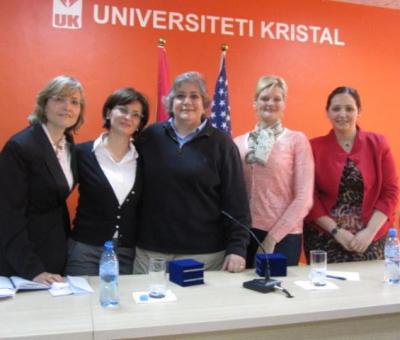
INCREASING WOMEN’S POLITICAL PARTICIPATION IN ALBANIA
u003cpu003eIn advance of local elections, the WDN Albania Country Chapter partnered with the Coalition of Domestic Observers to increase women’s participation in the electoral process. The Chapter provided u003cstrongu003esix long-term observers and more than 25 short-term observersu003c/strongu003e who aided in monitoring the preparation, polling and vote counting processes of the elections. After the elections, Chapter members worked diligently to observe the tabulation of votes, including the highly-contested mayoral seat in Tirana.u003c/pu003eu003cpu003eThe Chapter also led an electoral campaign training, resulting in u003cstrongu003eeight Chapter members running for elected officeu003c/strongu003e in these local elections. Two of the members won seats in the Municipality of Tirana.u003c/pu003e
May
2011
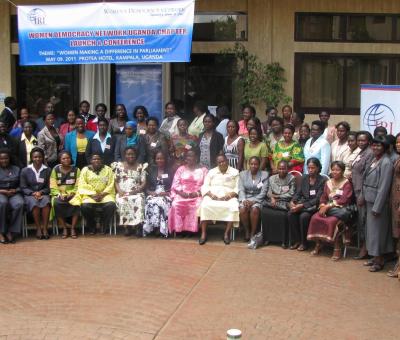
LAUNCH OF COUNTRY CHAPTER IN UGANDA AND NEW PARTNER BANGLADESH
u003cpu003eIn May, WDN launched a Country Chapter in Uganda at an event entitled “Women Making a Difference in Parliament,” organized in collaboration with IRI’s Uganda program. The Country Chapter u003cstrongu003efocused on providing a platform for women leaders to enhance their leadership capacities and empower women to engage in political and socio-economic issues. u003c/strongu003eThe Chapter’s membership included Members of Parliament, local councilors, civil society leaders, business leaders, media representatives, academics and university students. u003c/pu003eu003cpu003eFour months later, WDN welcomed the Bangladesh Women’s Chamber of Commerce and Industry (BWCCI) as a local partner organization. BWCCI focused on increasing women’s political and economic empowerment and building awareness of democratic rights afforded to women.u003c/pu003e
June
2011
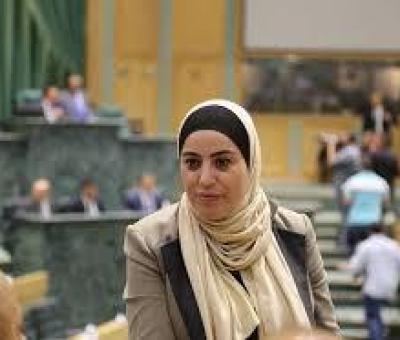
WDN MEMBERS ELECTED TO OFFICE IN PERU, JORDAN AND MACEDONIA
u003cpu003eIn April, WDN Peru member Marisol Espinoza was u003cstrongu003eelected Vice President of Peruu003c/strongu003e. Espinoza previously served as a member of the Peruvian Congress and was the Congressional Whip of the Peruvian Nationalist Party. u003c/pu003eu003cpu003eWDN Jordan member and Parliamentarian Wafa Bani Mustafa was elected in May to serve as chairwoman of the Change Bloc in the Parliament’s lower house. This remarkable achievement was the u003cstrongu003efirst time in the Jordanian parliament’s history that a woman was elected to this positionu003c/strongu003e. u003c/pu003eu003cpu003eIn June, long-time WDN Macedonia member Tanja Tomic was u003cstrongu003eelected to Parliament of the Republic of Macedonia u003c/strongu003eand expressed her continued dedication to carrying out the mission of WDN as a member of parliament.u003c/pu003e
September
2011
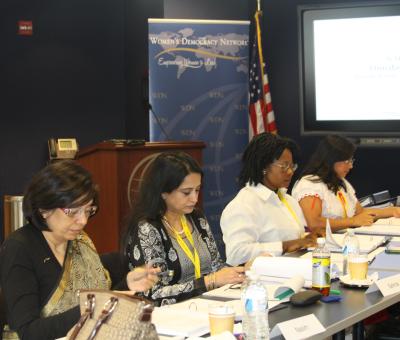
LAUNCH OF WOMEN’S LEADERSHIP SCHOOLS
u003cpu003ePartnering with WDN Advisory Council Member Rachel Woods, WDN developed the Women’s Leadership School (WLS) training curriculum. The WLS curriculum was designed to u003cstrongu003eincrease young women’s political knowledgeu003c/strongu003e, encourage them to get involved in political decision-making processes in their community and to become actively involved in public life. u003c/pu003eu003cpu003eThrough the WLS, u003cstrongu003eexperienced women activists assist inexperienced or marginalized womenu003c/strongu003e in their communities to gain the confidence to be active in public life by building effective leadership skills and by providing instruction on the democratic processes in their countries, and teaching the practical skills to implement what they have learned. u003c/pu003e
December
2011
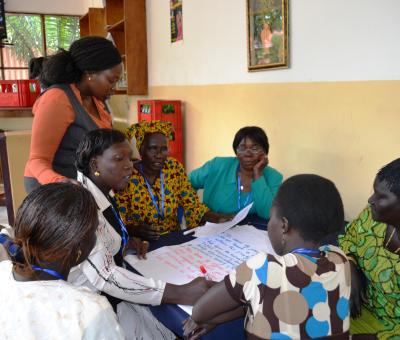
BRINGING WOMEN TOGETHER IN SOUTH SUDAN
u003cpu003eIn South Sudan, WDN brought together 75 women to improve their capacity to participate in politics and ascend to leadership roles. u003c/pu003eu003cpu003eWDN utilized expert trainers from Kenya, the Netherlands, United States and Zimbabwe to develop the participant’s political skills and knowledge. u003cstrongu003eAt the conclusion of the conference, the participants put their training into practice and formed a united women’s coalition that included members from 16 distinct political parties.u003c/strongu003eu003c/pu003e
January
2012
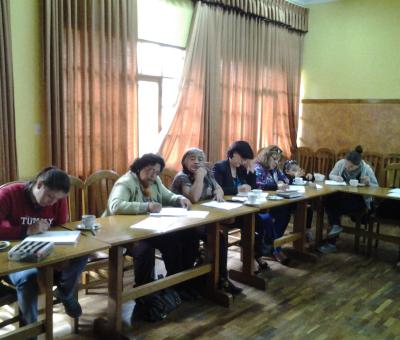
WOMEN LEADERSHIP SCHOOLS IN BANGLADESH, CAMEROON, GEORGIA, AND GUATEMALA
u003cpu003eTwenty-four Women’s Leadership Schools (WLS) were held in Bangladesh, Cameroon, Georgia, and Guatemala. u003cstrongu003eAs a result of WLS, nearly 600 women gained the skills and confidence to assume leadership roles in their communities.u003c/strongu003e As part of this program, the Bangladesh Women’s Chamber of Commerce and Industry trained 146 women from various socio-economic backgrounds; the Cameroon Country Chapter trained 151 women from different political parties; the Georgia Country Chapter trained 149 aspiring young women and; the Guatemala Country Chapter trained 145 women from rural areas.u003c/pu003e
February
2012
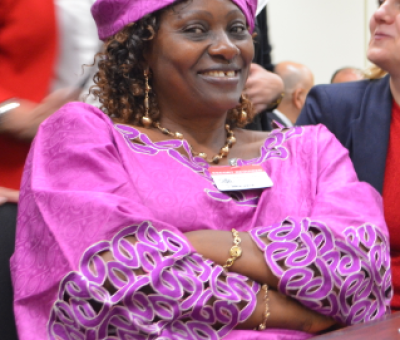
WDN CAMEROON COUNTRY MEMBER RECEIVES THE “100 WORLD OF DIFFERENCE AWARD”
u003cpu003eWDN’s Cameroon Country Chapter member u003cstrongu003eAnne Stella Fomumbod was selected as a recipient of the 2012 “100 World of Difference Award” by the u003ca href=u0022https://www.wdn.org/100%20World%20of%20Difference%20Awardu0022u003eInternational Alliance for Womenu003c/au003e (TIAW)u003c/strongu003e, a global organization dedicated to the economic empowerment and advancement of women all over the globe. Each year, TIAW presents “100 World Difference Awards” to dynamic individuals whose efforts have advanced the economic empowerment of women locally, regionally or worldwide. u003c/pu003eu003cpu003eu003c/pu003e
March
2012
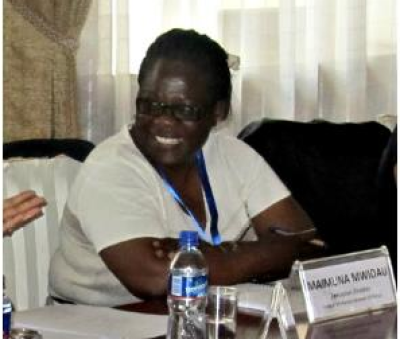
WDN MEMBER MAIMUNA MWIDAU RECOGNIZED FOR DEDICATION TO WOMEN’S EMPOWERMENT IN KENYA
u003cpu003eWDN member Maimuna Mwidau works tirelessly to help women in Kenya and around the world achieve their goals. Mwidau chaired the League of Muslim Women of Kenya for over a decade u003cstrongu003eheading efforts to ensure Muslim women’s inclusion in political processesu003c/strongu003e. In recognition of Mwidau’s prominent voice for women’s empowerment and commitment to advancing freedom and democratic values in her country, the International Foundation for Electoral Systems chose u003cstrongu003eMwidau as a recipient of its 2012 Charles T. Manatt Democracy Award.u003c/strongu003eu003c/pu003e
March
2013
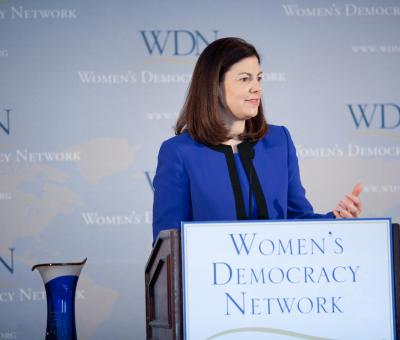
WDN HONORS SENATOR KELLY AYOTTE AND BANGLADESH ACTIVIST SELIMA AHMAD WITH 2013 JEANE J. KIRKPATRICK AWARD
u003cpu003eWDN held its annual Jeane J. Kirkpatrick Award ceremony, honoring women who have made outstanding contributions to the advancement of women in politics and civil society. In 2013, we honored U.S. Senator Kelly Ayotte (NH) and Selima Ahmad, founder and former president of the Bangladesh Women Chamber of Commerce and Industry. u003c/pu003eu003cpu003eIn her remarks, Senator Ayotte praised WDN and reminded the audience of the importance of women’s voices in the public sphere. u003cstrongu003e“I am deeply honored to be here to receive this award and want to commend you for what you all are doing to encourage women to get involved in public policies, civic engagement and leadership positions, because we know that if we leave half the population out no country can reach its full potential.”u003c/strongu003eu003c/pu003e
March
2013
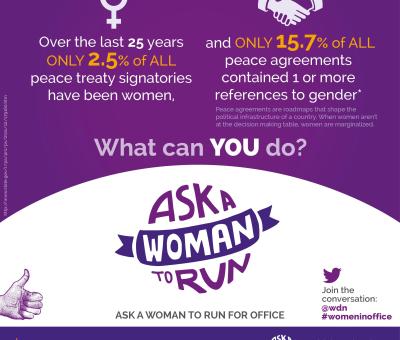
u0022ASK A WOMAN TO RUNu0022 ONLINE CAMPAIGN
u003cpu003eWDN’s u003cstrongu003eu0022Ask a Woman to Runu0022 social media campaign was launched to encourage both women and men to u0022ask a woman to runu0022 for public office. u003c/strongu003eDuring the campaign, WDN hosted its first Twitter chat as part of a digital rally organized by Devex, the largest online platform for the international development community. WDN’s Twitter chat invited participants to highlight the strategies and initiatives implemented in their country to increase women’s participation in politics. u003c/pu003e
December
2013
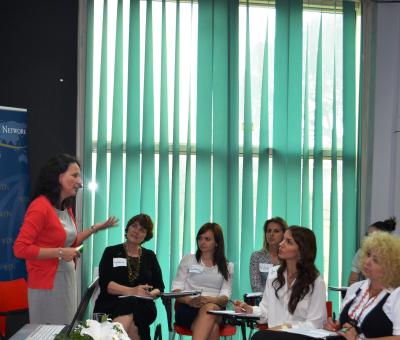
ALBANIA COUNTRY CHAPTER SUCCESS
u003cpu003eWDN’s Albania Country Chapter formally launched the Alliance of Women Parliamentarians Caucus in December 2013. The Chapter conducted three public decentralized hearings with the caucus, in which u003cstrongu003e225 constituents were able to influence the Caucus’ legislative agenda by vocalizing their concerns.u003c/strongu003e As a result of the issues brought up in the decentralized hearings, the caucus worked to amend the electoral law for the 2015 local elections to ensure a gender quota is instituted.u003c/pu003eu003cpu003eu003c/pu003e
December
2013
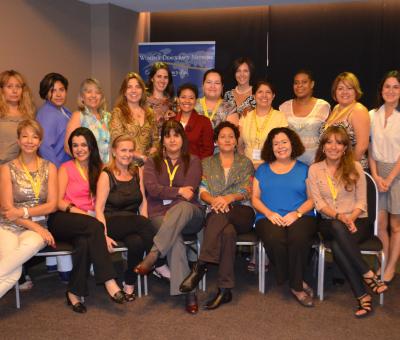
WDN LATIN AMERICA CONFERENCE
u003cpu003eWDN hosted a two-day conference in Buenos Aires, Argentina that brought together 19 WDN members from 11 countries. The conference was an opportunity for members to u003cstrongu003efocus on advancing women’s political empowerment in their countries by sharing common obstacles as well as best practices for women’s political participation in the regionu003c/strongu003e. u003c/pu003eu003cpu003e2014u003c/pu003eu003cpu003eu003c/pu003e
January
2014
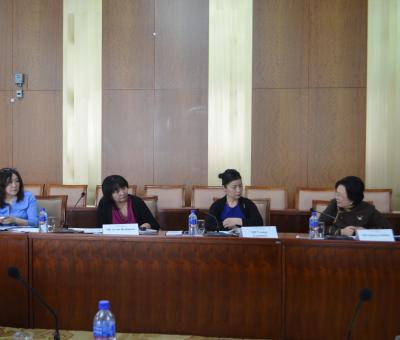
MONGOLIAN WOMEN’S PARLIAMENTARY CAUCUS
u003cpu003eFollowing the Mongolian 2012 elections, WDN established the Mongolian Women’s Parliamentary Caucus. The caucus started with 11 WDN members and parliamentarians dedicated to issues facing women constituents throughout the country. u003cstrongu003eNetwork members held a workshop for women parliamentariansu003c/strongu003e to refocus their legislative agenda for their remaining two years and ensure that the caucus had the skills necessary to carry out legislative initiatives. u003cstrongu003eAs a result, the Caucus passed the Anti-Tobacco law.u003c/strongu003eu003c/pu003eu003cpu003eu003c/pu003e
January
2014
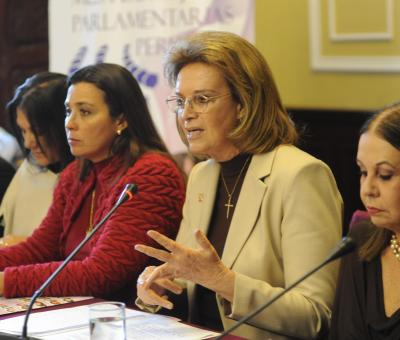
PARTNERING WITH THE WOMEN’S PERUVIAN PARLIAMENTARY CAUCUS
u003cpu003ein 2014, WDN’s partner, the Women’s Peruvian Parliamentary Caucus (MMPP) held four public decentralization hearings throughout the country that reached 1,035 constituents. As a result of the discussions, the Peru Chapter worked with the caucus on combatting domestic violence and anti-human trafficking legislation to be presented through the Women and Family Commission. u003cstrongu003eWorking together, the Caucus was successful in requesting more emergency centers for women in the decentralized regions of the country through the Ministry of Interior.u003c/strongu003eu003c/pu003eu003cpu003eu003c/pu003e
February
2014
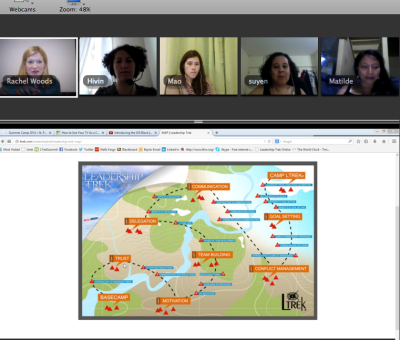
LAUNCH OF LEADERSHIP TREK
u003cpu003eThe Leadership Trek program was launched to help aspiring and experienced women leaders refine their leadership skills while establishing personal development goals. u003cstrongu003eThe platform also provides an online forum for discussions with peers from around the world, while providing an unparalleled opportunity for continued mentorship and coaching.u003c/strongu003eu003c/pu003eu003cpu003eu003c/pu003e
February
2014
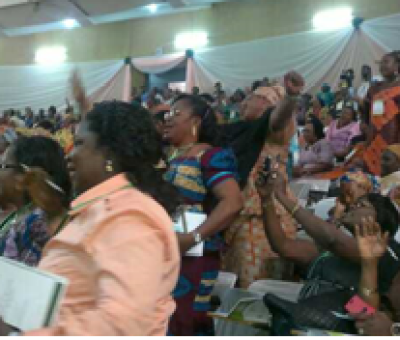
BUILDING BRIDGES OF OPPORTUNITY IN NIGERIA
u003cpu003eWDN-Nigeria member Maimuna Mwidau led the first National Nigerian Women’s Strategy Conference, “Building Bridges of Opportunity; 2015 and Beyond” in Abuja, Nigeria. u003c/pu003eu003cpu003eu003c/pu003e
March
2014
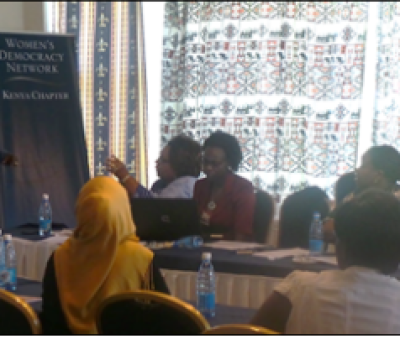
WDN UGANDA CHAPTER LEAD TRAINS WDN KENYA CHAPTER
u003cpu003eWDN-Uganda Country Chapter Lead, Perry Aritua, trained the WDN-Kenya Country Chapter on best approaches to grow the Chapter’s programmatic outreach. The 25 Chapter members u003cstrongu003eproduced a five-year action planu003c/strongu003e. u003c/pu003eu003cpu003e2015u003c/pu003eu003cpu003eu003c/pu003e
January
2015
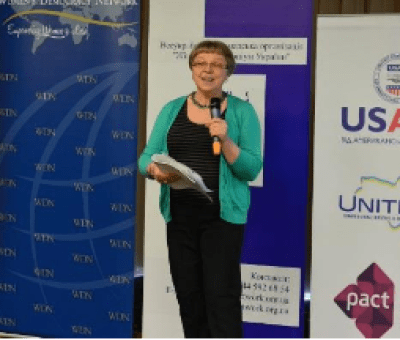
WDN UKRAINE ELECTION REPORT
u003cpu003eIn Ukraine, WDN members presented the results of their Parliamentary Elections 2014 Gender Monitoring project. The report also provided u003cstrongu003erecommendations for enhancing women’s participation in political life as well as identified viable methods of getting more women elected to officeu003c/strongu003e.u003c/pu003eu003cpu003eu003c/pu003e
March
2015
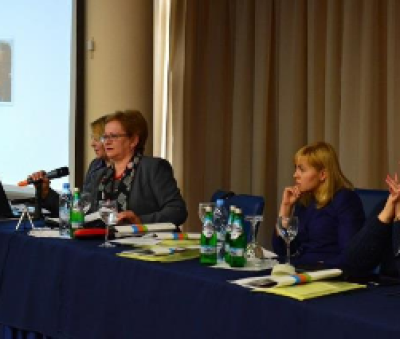
INTERNATIONAL WOMEN’S DAY
u003cpu003eThe International Women’s Day (IWD) conference brought together u003cstrongu003enine women parliamentariansu003c/strongu003e from Albania, Bosnia and Herzegovina, Democratic Republic of Congo, Jordan, Mongolia, Peru and Tunisia. The women attended intensive workshops on democratic governance, best practices in constituent outreach, legislative drafting on coalition building. u003c/pu003eu003cpu003eu003c/pu003e
March
2015
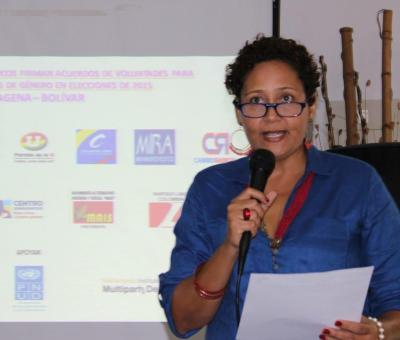
ENCOURAGING WOMEN TO PARTICIPATE IN COLOMBIAN ELECTIONS
u003cpu003eAhead of the Colombian 2015 municipal elections, WDN’s local partner in Colombia, Red de Empoderamiento de las Mujeres Cartagena de Indias y Bolívar (Women’s Empowerment Network Cartagena de Indias and Boliviar), WDN’s local partner in Colombia, u003cstrongu003espearheaded a media campaign to encourage women to support female candidatesu003c/strongu003e. Further capitalizing on this initiative, Red de Empoderamiento de las Mujeres Cartagena de Indias y Bolívar provided campaign consultation services to female candidates.u003c/pu003eu003cpu003eu003c/pu003e
April
2015
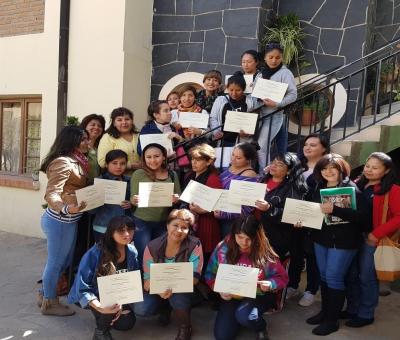
WOMEN’S LEADERSHIP SCHOOL PARTICIPANTS ELECTED TO OFFICE
u003cpu003eIn advance of the 2015 municipal elections, the WDN Bolivia Country Chapter trained u003cstrongu003e30 rural and urban womenu003c/strongu003e through the Women’s Leadership School (WLS) curriculum. Following the training, the women participants went on to participate as campaign and political party volunteers, election poll watchers and electoral candidates. u003c/pu003eu003cpu003eWLS participant Claudia Bravo was elected to the city of La Paz’s local council and WLS participant Soledad Chapeton was elected Mayor of El Alto. u003cstrongu003e34 year old, Chapeton was the first female opposition party member to become mayor of El Alto— a city of 800,000 inhabitants.u003c/strongu003eu003c/pu003e
April
2015
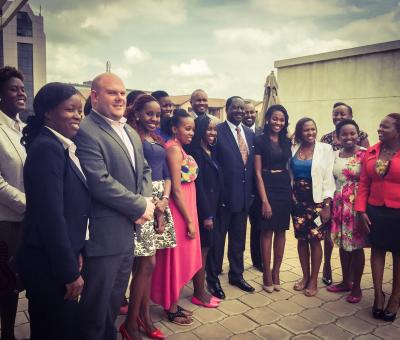
EMPOWERING YOUNG WOMEN THROUGH FILM
u003cpu003eThe Kenya Country Chapter and the Kenya University Female Student Leaders Association (KUFSLA) co-hosted the Women in Red campaign screening, which u003cstrongu003eshowcased documentaries focused on inspiring female leadersu003c/strongu003e. The WDN Kenya Country Chapter members, including former member of parliament Catherine Nyamato, outlined challenges facing women in political leadership and how to overcome them. After the last screening, KUFSLA resolved u003cstrongu003eto take a multi-faceted approach to engage more young women in politicsu003c/strongu003e. This included holding campus forums, establishing mentorship programs for girls in high school and conducting post-graduate mentorship forums as part of a national campaign aimed at preparing young women for the 2017 elections. u003c/pu003e
March
2016
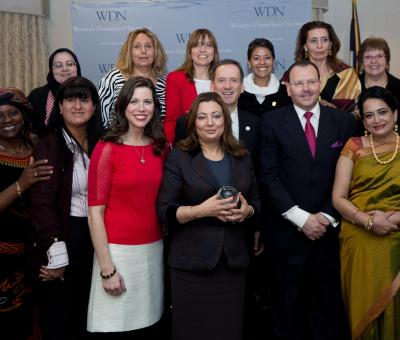
WDN TURNS TEN
u003cpu003eIn its first ten years, WDN trained more than 15,000 women from around the world. More than u003cstrongu003e600 women from the WDN network have run for local or national officeu003c/strongu003e and more than 160 have been elected. u003c/pu003eu003cpu003eWDN has helped more than u003cstrongu003e500 women register to vote, 800 join political partiesu003c/strongu003e and has worked with more than 120 female political party leaders. Seven hundred WDN members have joined civil society organizations and over 300 members have led advocacy campaigns in their country. u003c/pu003eu003cpu003eWDN collaborated with over u003cstrongu003e30 local partner organizationsu003c/strongu003e worldwide and established u003cstrongu003e15 Country Chaptersu003c/strongu003e. WDN’s partners have reached an u003cstrongu003eadditional 3,400 womenu003c/strongu003e around the world.u003c/pu003e
March
2016
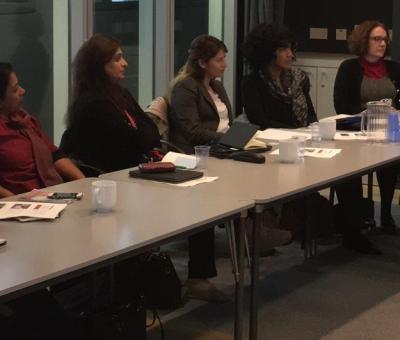
WOMEN IN PEACE AND SECURITY STUDY TOUR
u003cpu003eIn partnership with the u003ca href=u0022https://www.democracyendowment.eu/u0022u003eEuropean Endowment for Democracyu003c/au003e, WDN led a study tour in Brussels, Belgium for four women leaders in the peace and security sector: Zana Marjanovic, a member of the multi-party parliamentary Women’s Caucus of the Federation of Bosnia and Herzegovina; Fatemah Bagi, an elected member of the Tripoli Municipal Council; Maia Sandu, former Minister of Education in Moldova; and Lobna Jeribi, founder of Initiative Solidar Tunisia.u003c/pu003eu003cpu003eu003c/pu003e
June
2016
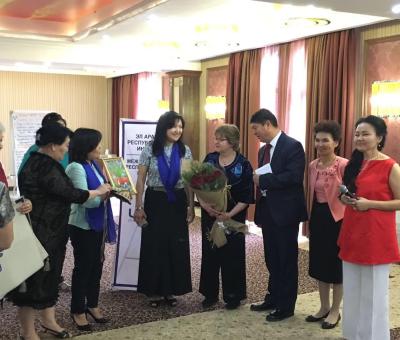
FORMING A NEW PARTNERSHIP IN KYRGYZSTAN
u003cpu003eu003cstrongu003eOne-hundred and fifteen women, including members of political parties, members of parliament, deputies of local councils, civil society representatives, and representatives from international organizationsu003c/strongu003e joined a two-day conference hosted by WDN in cooperation with Zhenskaya Demokratichyskaya Set (ZDS), a local NGO in Kyrgyzstan.u003c/pu003eu003cpu003eThe conference gave women from Kyrgyzstan a platform to discuss the barriers to women’s political and economic access. One ZDS coordinator from Issyk-Kul Oblast noted, “u003cstrongu003eWe have been actively working for three years to reach this goal. This is our invaluable achievement and success.u003c/strongu003e”u003c/pu003e
September
2016
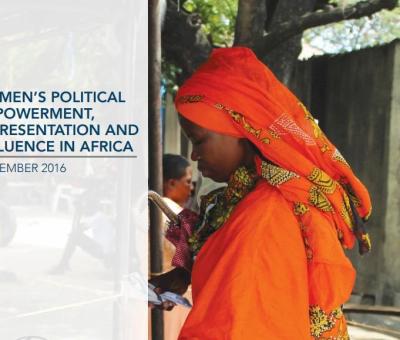
PUBLICATION OF THE INDEX ON WOMEN’S INFLUENCE IN AFRICAN POLITICS
u003cpu003eIn order to better understand the challenges to gender equality in political representation and influence, WDN initiated a pilot study to develop a new, quantitative measure to capture women’s political leadership beyond the percentage of parliamentary seats or executive positions held by women. u003c/pu003eu003cpu003eThe u003ca href=u0022https://www.wdn.org/Women%E2%80%99s%20Political%20Empowerment,%20Representation,%20and%20Influence%20in%20Africau0022u003eWomen’s Political Empowerment, Representation, and Influence in Africau003c/au003e report (also known as the Women’s Leadership Index) collected two new variables for 29 African countries related to women’s political leadership. In combination with widely used data on women’s political leadership, the report ranks the countries on four indicators focused on legislative and executive leadership. u003cstrongu003eThe results provide a nuanced picture of where countries perform well on the four different measures of influence in legislative and executive branches of power and show the correlation between women’s political representation, leadership and influence.u003c/strongu003eu003c/pu003e
March
2017
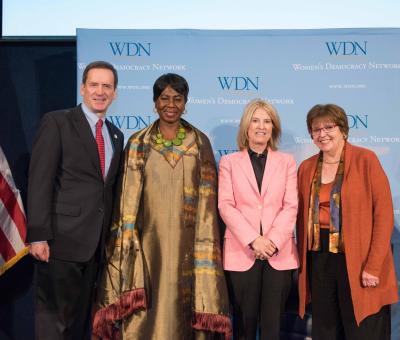
CELEBRATING GRETA VAN SUSTEREN AND DR. ISATOU TOURAY
u003cpu003eWDN honored Greta Van Susteren, Anchor MSNBC, and Dr. Isatou Touray, Minister of Trade, Industry, Regional Integration and Employment for the Republic of the Gambia with the annual Jeane J. Kirkpatrick Award. u003c/pu003eu003cpu003eCommending WDN’s emphasis on mentorship, Van Susteren emphasized the importance of female role models: u003cstrongu003e“It’s not that hard to be a good role model. Be nice. Be kind. Do more. Make a difference.”u003c/strongu003eu003c/pu003e
March
2017
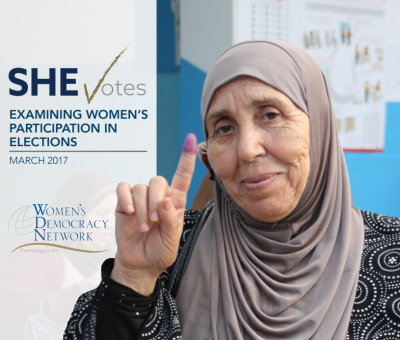
LAUNCH OF THE u0022SHE VOTES” TOOLKIT
u003cpu003eWDN launched the “u003ca href=u0022https://www.iri.org/wp-content/uploads/2021/10/shevotes_assessment.pdfu0022u003eShe Votesu003c/au003e” toolkit, a resource that identifies women candidates and voters at the individual, governmental, and society level.u003c/pu003eu003cpu003eu003cstrongu003eThe information gained through the toolkit’s use is used to design the interventions necessary to increase women’s political participation and leadership.u003c/strongu003e By assessing women’s participation in elections as voters and candidates, “SheVotes” provides practitioners with the data needed to address these deficiencies and empower women around the world.u003c/pu003e
May
2017
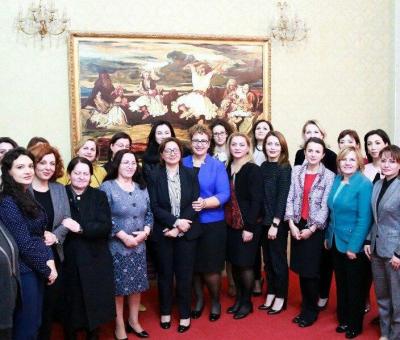
ALBANIA: LAUNCH OF “ASK A WOMAN TO RUN”
u003cpu003eIn advance of the June 2017 parliamentary elections, the WDN Albania Country Chapter hosted the “Ask a Woman to Run” two-day workshop, covering the essential elements in running a successful political campaign. u003cstrongu003eOut of the 26 women candidates trained, three were successfully elected as members of parliament and all 10 campaign managers who completed the training saw their candidates elected.u003c/strongu003eu003c/pu003eu003cpu003eu003c/pu003e
June
2017
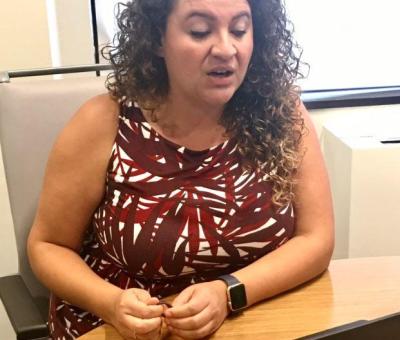
ENGAGING OUR MEMBERS: VIDEO TELECONFERENCES
u003cpu003eWith over 3,000 active members in over 80 countries, WDN is committed to remaining engaged with our partners. In response to requests from local partners and global members, WDN launched monthly video teleconferences (VTCs) to u003cstrongu003ebring together groups of women from around the world to discuss a rotating list of topicsu003c/strongu003e. u003c/pu003eu003cpu003eThe inaugural training, “Telling Your Story,” taught participants u003cstrongu003eto utilize social media to captivate and motivate their audience.u003c/strongu003e Fourteen women representing 12 countries participated in the training, including women from the Democratic Republic of the Congo, Mongolia, Nigeria, and Spain. u003c/pu003e
September
2017
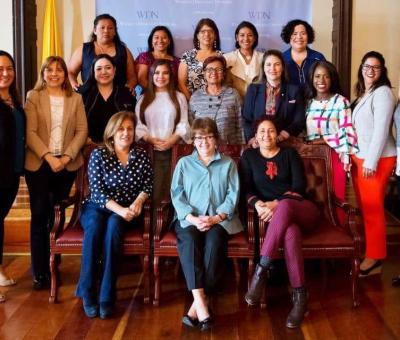
WELCOMING WDN LATIN AMERICA
u003cpu003eWDN members u003cstrongu003efrom nine Latin American countries gathered for a two-day conferenceu003c/strongu003e to discuss ways to promote WDN’s mission of women’s empowerment on a regional scale. After initially meeting at a 2009 WDN conference in Peru, members from Argentina, Bolivia, Brazil, Colombia, Guatemala, Mexico, Nicaragua, Peru, and Venezuela reunited in Cartagena, Colombia to create an inter-regional association of WDN members in Latin America.u003c/pu003eu003cpu003eu003c/pu003e
October
2017
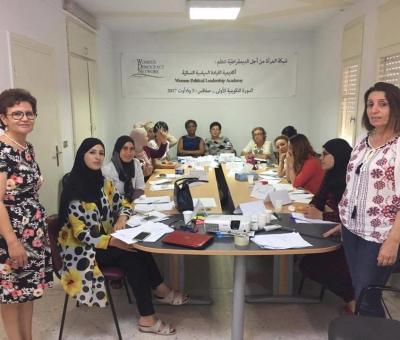
MEMBER HIGHLIGHT: FAOUZIA ABIDI FROM TUNISIA
u003cpu003eWDN’s Women’s Political Leadership Academy curriculum has been a successful tool in helping empower women and increase their capacity to achieve leadership roles at various levels. At the beginning of the Tunisia Country Chapter’s WPLA training in Sfax, Faouzia Abidi, a member of the Takattol Party, was identified as being very shy and quiet. During the “All About Me” session, it became evident that she was eager to step out of her comfort zone and wanted to work to recruit young people to her party. u003cstrongu003eThree weeks after the training, Faouzia’s party held its annual congress and she was elected as a member at the national level at only 24 years of ageu003c/strongu003e. u003c/pu003eu003cpu003eFaouzia said that the “Communication to Change the World” session helped her craft her campaign message. She was able to u003cstrongu003esuccessfully convey her views on the need to give the youth a chance to be involved in the country’s democratic transition.u003c/strongu003eu003c/pu003e
December
2017
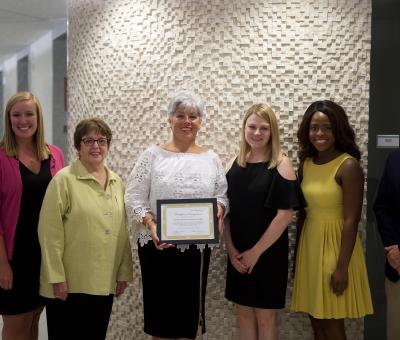
LAUNCH OF WDN’S FIFTEENTH COUNTRY CHAPTER
u003cpu003eThe launch of the WDN Paraguay Chapter marked the fifth Country Chapter in the Latin America and Caribbean region and WDN’s fifteenth Chapter worldwide. u003cstrongu003eFocusing on increasing women’s political leadership and preventing violence against womenu003c/strongu003e, the Chapter advocated for two pieces of legislation, one on democratic gender parity and another on protecting women from violence.u003c/pu003e
January
2018
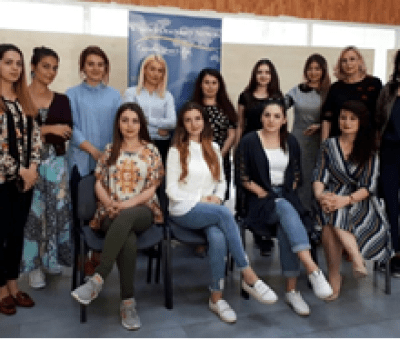
ALBANIA: ASK A WOMAN TO RUN ALUMNA ELECTED
u003cpu003eWDN Member and “Ask a Woman to Run” training alumna Dhurata Cupi was elected by her fellow women members of parliament to lead to the Alliance of Women MPs in Albania. Albania held parliamentary elections in June 2017, but when members took their seats in September 2017, MPs did not organize to create the women’s caucus for this term. Cupi first participated in a training with WDN in April 2017, when she led a public hearing on the subject of territorial and administrative reform and sustainable development in Albania. WDN Albania will continue to support Cupi by working with heru003cstrongu003e to develop and implement legislative priorities for the Alliance of Women MPs. u003c/strongu003eu003c/pu003eu003cpu003eu003c/pu003e
February
2018
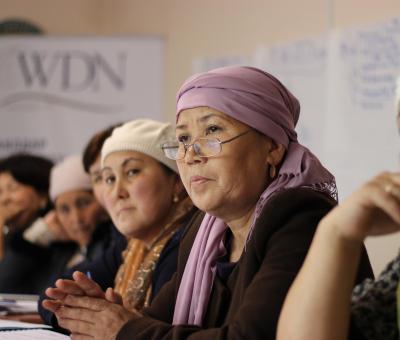
KYRGYZSTAN WDN MEMBER APPOINTED TO MANAGE BUDGET COMMITTEE
u003cpu003eAfter attending a training conducted by local partner ZDS, local politician Nurgul Sadykova, held a public hearing to demand accountability and tackle corruption in local government. Head of the village government to report to the government accountant and develop a report on the work that has been done so far. At the conclusion of the public hearing, deputies decided to remove the head of the government, accountant, and speaker. Later, Sadykova was u003cstrongu003eappointed speaker and now manages all activities in the budget committeeu003c/strongu003e. She hopes that through her leadership she can u003cstrongu003eincrease the accessibility of the local budget and make it more transparentu003c/strongu003e.u003c/pu003eu003cpu003eu003c/pu003e
March
2018
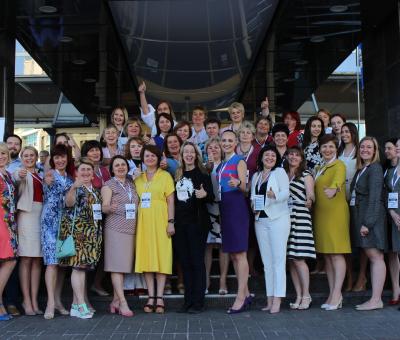
UKRAINE: TRANSPARENCY AT THE NATIONAL LEVEL
u003cpu003eDuring a roundtable with local council members in Pervomaisk, the coordinator of WDN-Ukraine Southern Region, Iryna Slavova, held a session entitled, “Transparency of State Power.” This resulted in the evaluation of the activities of community enterprises in six local councils in the region, forcing them to report on their expenditures during local council sessions. PDuring a regional conference in the Pervomaisk region, participants adopted a resolution that demonstrated their support for a gender quota. The resolution was submitted to the city councils in the Pervomaisk region. u003c/pu003eu003cpu003eThe councils were called to join councils in other regions to make an appeal to the Verhovna Rada (National Parliament) of Ukraine u003cstrongu003ein support of the 40 percent gender quota. u003c/strongu003eu003c/pu003e
April
2018
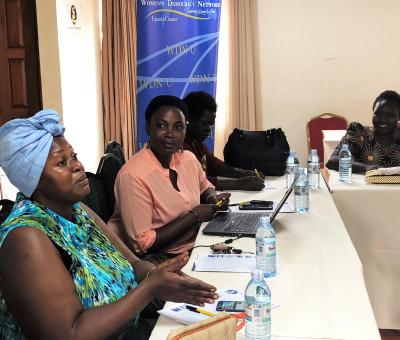
UGANDA: TRAINING SUCCESSES
u003cpu003eThe WDN Uganda Country Chapter has been working with women in specific leadership positions in local councils to increase their effectiveness in their respective districts. Honorable Manda Christine, District Speaker of Pakwach district, shared her experiences following this training when she chaired a very tense meeting on the district budget for the 2018-2019 fiscal year. Citing the lessons learned during a training session on effectively chairing meetings, she adjourned the session temporarily so that councilors could consult with technical staff on budget areas that had not been well explained. Councilors responded positively to this action and when the session resumed, the issues causing conflict were clarified and the council could proceed to pass the budget. u003c/pu003eu003cpu003eThe Honorable Natalie Drateru, Secretary for Production and Agriculture in Arua district, shared that prior to the training, she lacked confidence and felt intimidated by the technical staff in her department. She informed the Chapter that with her newfound confidence from the training, she was able to reform the distribution of funds under Operation Wealth Creation (OWC), a project to improve household income through the facilitation of sustainable commercial agricultural production. Said Drateru, “u003cstrongu003eThere are now ratios for women and youth to ensure that every citizen, regardless of sex, benefits from government programs like OWC.u003c/strongu003e”u003c/pu003e